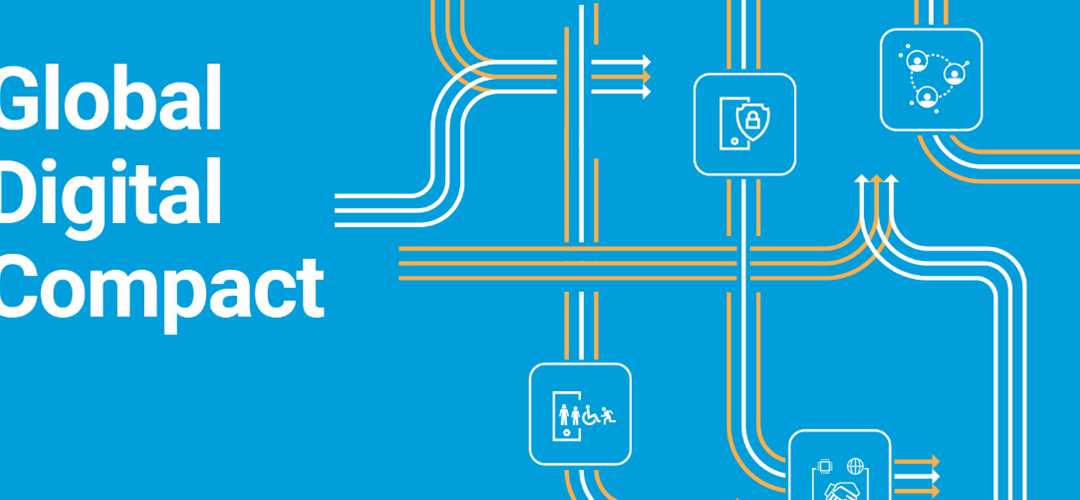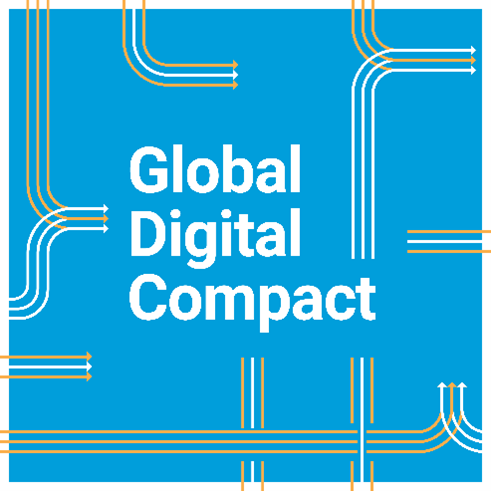
UN Digital Compact: Our submission on businesses as forces for good in a digital society
The text describes how Corporate Digital Responsibility (CDR) could contribute to an UN Global Digital Compact. We submitted it to the Office of the Secretary-General’s Envoy on Technology. In the text we emphasize that digital trust is the currency of the digital transformation, and responsible tech, AI ethics principles, or CDR are ways that businesses can position themselves as forces for good in a digital society. The CDR Manifesto, which is a set of seven principles developed by an international group of academics and corporate practitioners, is highlighted as an initiative that could contribute to the UN Global Digital Compact. The text then goes on to list core principles and key commitments for businesses in a Global Digital Compact related to fair and equitable access for all, protecting data, and applying human rights online. The inputs for the Global Digital Compact were collected through exchange via social media, especially LinkedIn Business community.
To prepare this input, we read and analyzed the text to understand its main points and arguments. We researched the UN Global Digital Compact and Corporate Digital Responsibility (CDR) to gain a better understanding of these concepts and how they match. We invited experts on Corporate Responsibility and Digital Ethics from social media, especially LinkedIn Business community, to exchange and support (see also the call from June 2022 „UN Global Digital Compact: Would you like to join the contribution based on the CDR manifesto?“). Finally, I organized the information and discourse into a structured text document that was open for collaboration. Finally, all supporters ageed to the text before it was submitted.
Describe the process you followed to collect, consult, and prepare your input.
Exchange via social media, especially LinkedIn Business community.
Actual list of supporters
- Dr. Saskia Dörr https://www.linkedin.com/in/sdoerr/ (contact person)
- Markus Besch https://de.linkedin.com/in/markusbesch
- Prof. Karen Elliott https://www.linkedin.com/in/karen-elliott-3b692725/
- Franziska Köppe https://www.linkedin.com/in/franziskakoeppe/
- Rob Price https://uk.linkedin.com/in/rob-price-4a44884
- Karolina Stuhec-Meglic https://www.linkedin.com/in/karolina-stuhec-meglic
- Tina Teucher https://de.linkedin.com/in/tinateucher
- Boris Thienert https://www.linkedin.com/in/borisai/
Digital trust is the currency of the digital transformation and it is the basis for business success. With many initiatives focusing on responsible tech, AI ethics principles or Corporate Digital Responsibility businesses are positioning themselves as forces for good in a digital society. Therefore we emphasise the economy and business as key stakeholders for digital collaboration and a Global Digital Compact.
As one of many initiatives we would like to draw the attention to the Corporate Digital Responsibility Manifesto, a set of seven principles. It was developed in 2021 by an international group of academics, corporate practitioners and published authors. We understand Corporate Digital Responsibility (CDR) is a set of normative practices and behaviours that help an organisation use data and digital technologies in ways that are perceived as socially, economically, and environmentally responsible.
The principles and recommendation of the CDR Manifesto could contribute to a UN Global Digital compact.
We (as a community) have already been engaging with the UN in regard to the CODES Global Action Plan for a Sustainable Planet in the Digital Age, launched by UN June 2022. This plan references and quotes CDR (page 12 and more). We understand the CODES community is also responding directly.
For more information please see https://corporatedigitalresponsibility.net
Inputs to the Global Digital Compact
- Connect all people to the internet, including all schools
- a) Core Principles
Core principle “Fair and Equitable Access for All”
Justice, Equity, Diversity & Inclusion drives a need to engage different stakeholders of businesses, like customers and employees, effectively in the use of digital technologies and services. (cf. CDR manifesto principle 2 https://corporatedigitalresponsibility.net/cdr-manifesto#cededdda-86a4-46ac-b3ba-d6b38b158620)
- b) Key Commitment/ Pledges/ Actions
Key Commitments for businesses in a Global Digital Compact
Innovative, Accessible and Inclusive Products & Services
- Ensure all parts of society have access to digital technologies (connectivity, tools and know-how)
- Ensure that products and services are inclusive by design, user-centric, convenient and accessible design for all
- Facilitate improvements in social innovation through digital tools and technologies
Promote Justice, Equity, Diversity & Inclusion
- Promote diversity and diverse thinking, integrated into product and service design, avoiding tech/AI driven bias exacerbating societal perspectives
- Actively avoid discrimination within digital transformation of business
Responsible Employment Rights
- Ensure human and employee rights are maintained with responsible outsourcing of work to the gig economy
- Responsible employment rights across (digital) supply chain
- Respecting employee rights for privacy and human dignity at the digitalised workplaces
Just taxation of all digital products and services (cf. area 6. Regulation of artificial intelligence).
______________________
- Protect data
- a) Core Principles
Core principle “Promote Societal Wellbeing“
Protect data and personal privacy, empower people to engage and develop skills, and protect from harm to improve reputation and trust. (cf. CDR manifesto principle 3 https://corporatedigitalresponsibility.net/cdr-manifesto#29b15052-f38e-4237-a3a3-ff67dff17002)
- b) Key Commitment/ Pledges/ Actions
Key Commitments for businesses in a Global Digital Compact
Implement Strong Privacy
- Ensure data privacy protection for employees, customers, citizens and all stakeholders
Implement Responsible Data Practices
- Follow responsible data validation & disposal practices, including transparency of use & processing of external data
- Implement responsible cybersecurity protection and response practices
- Informing proactively when using tracking, scoring and profiling and giving opportunity to avoid
- Refrain from harmful behavioural manipulation by using data, tech and digital tools
_____________________
- Apply human rights online
- a) Core Principles
Core principle “Promote Societal Wellbeing“
Protect data and personal privacy, empower people to engage and develop skills, and protect from harm to improve reputation and trust. (cf. CDR manifesto principle 3 https://corporatedigitalresponsibility.net/cdr-manifesto#29b15052-f38e-4237-a3a3-ff67dff17002)
- b) Key Commitment/ Pledges/ Actions
Key Commitments for businesses in a Global Digital Compact
Promoting Digital Maturity Skills
- Addressing digital poverty & promoting inclusion (e.g. access to digital, access to digital finance, access to education and lifelong learning)
- Promote improvements in societal digital maturity (skills, trust and understanding)
Promoting Digital Wellbeing
- Pursuing socially ethical digital practices – to reduce amplification of ‘fake news’ & inappropriate digital influence (harm and digital wellbeing)
- Promoting physical & mental healthy lifestyle, supported or enhanced by digital products or services
Responsible sourcing of resources for digital products (socially AND ecologically)
______________________
- Regulation of artificial intelligence
- a) Core Principles
Core principle “Consider Economic and Societal Impact of automation”
Reputational need to consider the economic and societal impact of decisions within the organisation, including use of algorithms and artificial intelligence for automation (cf. CDR manifesto principle 4 https://corporatedigitalresponsibility.net/cdr-manifesto#cededdda-86a4-46ac-b3ba-d6b38b158620)
- b) Key Commitment/ Pledges/ Actions
Key Commitments for businesses in a Global Digital Compact
Plan for Sustainable & Responsible Automation
- Replacing jobs done by humans in a responsible way, consideration of retraining/reskilling programmes
- Ensure ethical and unbiased, explainable AI decision making algorithms
- Enable employees and project workers to understand the ethical dilemma and societal impact of tech and digital transformation through awareness training
- Actively engage with employee and project worker´s opinion and feedback in digital transformation, automation and tech implementation
Transparency with Stakeholders with Verifiable 3rd Party Data
- Ensure organisations & consumers understand sources of collected data, where it is, what is done with it, including scoring, profiling, reporting
Share Digital Economic Benefits with Relevant Stakeholders (incl. Open Data / Access)
- Sharing economic benefits of digital work with society, for example through appropriate taxation
- Respecting personal data ownership rights, reduce data piracy and enable individual monetization
- Promote open data to enable broad innovation by all (including opening Right to Repair)
______________________
- Other areas (please specify):
Specify area:
- Impact Economy
- Sustainability with digital
- Tech Impact (including Fintech)
- a) Core Principles
- Core principle “Accelerate Progress with Impact Economy”
To accelerate consumer demand of ecologically and societally better products. Incubate more cleantech and invest in sustainable and societal impact initiatives. (cr. CDR manifesto principle 5 https://corporatedigitalresponsibility.net/cdr-manifesto#49436810-3755-491a-ba5a-65f9b17a68ad)
- Core principle “Creating a Sustainable Planet to Live”
To move beyond Carbon Zero or Carbon Negative to Planet Positive, to create a more positive impact on the planet than your organizational scope using digital products and services (cf. CDR manifesto principle 6 https://corporatedigitalresponsibility.net/cdr-manifesto#b6fb833c-5cde-4685-9f4a-0f7545bad301)
- Core principle “Reduce Tech Impact on Climate & Environment”
To mitigate the impact of your organisations technology impact as you head towards Carbon Zero or Carbon Negative and Net Zero. (cf. CDR manifesto principle 7 https://corporatedigitalresponsibility.net/cdr-manifesto#a5e91405-b079-46ee-b893-c02d2257eb34)
- b) Key Commitment/ Pledges/ Actions
Key Commitments on Core principle “Accelerate Progress with Impact Economy” for businesses in a Global Digital Compact
Invest in Sustainability / Environmental / Impact returns
- Look to partner ecosystems across supply chain, engaging (and measuring impact of) ecotech, cleantech digital solutions or circular economy.
- Position for growth in environmental markets that align to purpose and positive planet impact
Use Verifiable Offset
- Understand Carbon Credit market and if using offset, look to use verifiable offset or digitally enabled natural carbon sequestration (like e.g. reforestation and afforestation)
Accelerate & Innovate Sustainable Consumer Behaviours
- Use Digital products to enable, for example, price discriminating digital tools that promote sustainable practices
- Consideration of economic models that are more conducive to sustainable practices
Key Commitments on Core principle “Creating a Sustainable Planet to Live” for businesses in a Global Digital Compact
Report impact of business against 3rd party impact assessments
- Promote transparent, sustainable and ethical working practices across the supply chain linked to a recognized sustainability reporting standard such as UN Global Compact, Global Reporting Initiative, SASB, ESG frameworks or BCorp, including digital responsibility practices
Innovate & Positively Impact Beyond Corporate Boundary
- Using Digital technologies or services, look to innovate and create new product lines or business capabilities that tangibly and positively impact
- Economic Sustainability – of supply chain, of people, of business
- Societal Sustainability – social cohesion, trust and privacy
- Environmental Sustainability (climate change, biodiversity, waste, resources)
- Introduce Circular Economy principles in Product and Service Design
- For example, contribution of data or APIs, or utilization of other technologies with data science of analytics to create new societal & environmental benefits
Key Commitments on Core principle “Reduce Tech Impact on Climate & Environment” for businesses in a Global Digital Compact
Implement an Environmental & Climate-resilient IT Strategy
- Following responsible recycling practices for digital technologies – target zero waste, promote circular economy
- Following responsible disposal practices for digital technologies, including extending tech life span, e.g. of smartphones and using refurbished IT
- Design in Environmental and climate resilient considerations in the use of digital technologies – e.g. Sustainable Web Design & IT Strategy, heat resistent and flood protected IT infrastructure.
Measure, Report, Minimise Energy use & move to Renewable Energy
- Reduce consumption by measuring & actively reducing Scope 1, 2 and 3 emissions using Digital tech
-
- In your data centres, and supply chain data centres, direct and indirect
- In your offices & business facilities
- In your travel & vehicle fleets
- In your decentralised asset base
- Use of renewable energies (wind, solar, water, biomass, geothermal) for energy supply of all digital technologies




